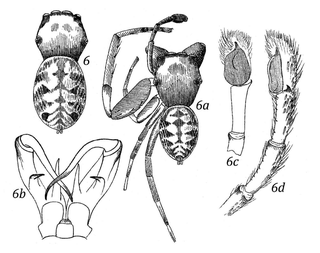
Anasaitis is a genus of jumping spiders that was first described by E. B. Bryant in 1950. The name is derived from the salticid genus Saitis.
Antillattus is a genus of Caribbean jumping spiders that was first described by E. B. Bryant in 1943. The name is a combination of "Antilles" and the common ending for salticid genera -attus.
Bryantella is a genus of jumping spiders that was first described by Arthur Merton Chickering in 1946. As of June 2019 it contains only two species, found only in Brazil, Argentina, and Panama: B. smaragda and B. speciosa. This genus was named in honour of Elizabeth B. Bryant.
Caribattus is a monotypic genus of jumping spiders containing the single species, Caribattus inutilis. It was first described by E. B. Bryant in 1950, and is only found on the Greater Antilles. The name is derived from "Caribbean", and -attus, a common suffix for salticid genera. The species name inutilis is Latin for "useless".

Compsodecta is a genus of Caribbean jumping spiders that was first described by Eugène Louis Simon in 1903.
Descanso is a genus of jumping spiders that was first described by George and Elizabeth Peckham in 1892. The name is derived from Spanish descanso, meaning "resting place ", from the verb descansar "to rest."
Parasaitis is a monotypic genus of jumping spiders containing the single species, Parasaitis femoralis. It was first described by E. B. Bryant in 1950, and is only found on the Greater Antilles. The name is a combination of the Ancient Greek "para" (παρά), meaning "alongside", and the salticid genus Saitis.
Parathiodina is a monotypic genus of jumping spiders containing the single species, Parathiodina compta. It was first described by E. B. Bryant in 1943, and is only found on Hispaniola. The name is a combination of the Ancient Greek "para" (παρά), meaning "alongside", and the salticid genus Thiodina.

Cycloctenidae is a family of spiders first described by Eugène Simon in 1898.
Elizabeth Bangs Bryant was an American arachnologist. She worked at the Museum of Comparative Zoology in Cambridge, Massachusetts and was a close acquaintance of James Henry Emerton. She is best known for her studies of the spiders of New England and the Caribbean.

Zygoballus concolor is a species of jumping spider which occurs in Cuba. It was first described by the arachnologist Elizabeth B. Bryant in 1940.
Trujillina is a genus of Caribbean wandering spiders first described by E. B. Bryant in 1948. As of April 2019 it contains only three species on Hispaniola and in Puerto Rico: T. hursti, T. isolata, and T. spinipes.

Plectophanes is a genus of South Pacific araneomorph spiders in the family Cycloctenidae, and was first described by E. B. Bryant in 1935.
Paratheuma is a genus of cribellate araneomorph spiders in the family Dictynidae, and was first described by E. B. Bryant in 1940. Originally placed with the ground spiders, it was transferred to the intertidal spiders in 1975, and to the Dictynidae in 2016.
Scaphioides is a genus of spiders in the family Oonopidae. It was first described in 1942 by Elizabeth B. Bryant.
Antillognatha is a monotypic genus of long-jawed orb-weavers containing the single species, Antillognatha lucida. It was first described by E. B. Bryant in 1945, and is found on Hispaniola.
Hispanognatha is a monotypic genus of long-jawed orb-weavers containing the single species, Hispanognatha guttata. It was first described by E. B. Bryant in 1945 from a male found on Hispaniola.

Notiodrassus is a genus of South Pacific ground spiders that was first described by E. B. Bryant in 1935. As of May 2019 it contains only two species, both found in New Zealand: N. distinctus and N. fiordensis.
Lomaita is a monotypic genus of Caribbean dwarf spiders containing the single species, Lomaita darlingtoni. It was first described by E. B. Bryant in 1948, and has only been found in Dominican Republic.

Zygoballus suavis is a species of jumping spider which occurs in Jamaica. The species was first described in 1895 by George and Elizabeth Peckham from specimens collected in Mandeville, Moneague, and Kingston. The type specimens are lost.






